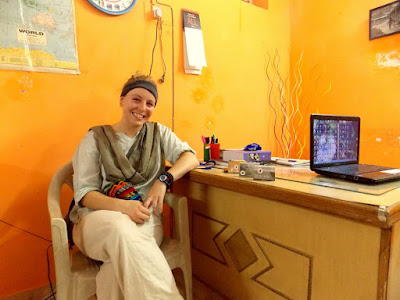International volunteering
International volunteering
Melaine Barlow (Tulane University )Volunteer At HEEALS
When an individual volunteers or group of volunteers
give their time to work for organizations or cause outside of their home
country. In most cases, volunteers work in developing countries on international
development programmes with local partners that address basic
needs such as education, health and sanitation. Trends show that international
volunteering has become increasingly popular across many countries over the
past few decades.
Melaine Barlow (Tulane University )Volunteer At HEEALS
When an individual volunteers or group of volunteers give their time to work for organizations or cause outside of their home country. In most cases, volunteers work in developing countries on international development programmes with local partners that address basic needs such as education, health and sanitation. Trends show that international volunteering has become increasingly popular across many countries over the past few decades.
History
Formal
overseas volunteering can be traced back over one hundred years to when the British Red Cross set up the Voluntary
Aid Detachment (VAD) scheme in 1909. The VAD volunteers, as well as
volunteers from many other national Red Cross organisations, worked in
battlefields across Europe and the Middle Eastduring World War I to treat soldiers
and civilians regardless of the side they fought for. Up to the mid-20th
century overseas volunteering projects were mainly undertaken by people with
direct connections to a particular cause and were considered more as short term
in nature. During the 1960s and 1970s a movement of volunteerism and study
abroad programs became popular among university students and graduates and the United Nations launched the UN Volunteers programme for young professionals to take part in a
long-term (2 year plus) overseas programme
Voluntourism .
In
recent years the accessibility of international volunteering has increased
significantly with many smaller charities connecting volunteers with
non-governmental organisations in developing countries. Travel companies have
also increasingly been offering paid volunteering opportunities; this growth
coincided with the increasing number of young people taking gap years and
has been termed volunteer tourism and voluntourism to
denote shorter-term voluntary work that is not necessarily the sole purpose of
the trip.
Volunteer base
International
volunteering and briefer voluntourism appeals
to a broad cross-section of society, but the majority of volunteers are in
their twenties and thirties, potentially due to perceptions of volunteering
abroad being a more risky activity.
Outcomes of international volunteering
Measuring
the outcomes of international volunteering is an ongoing challenge.
Costs In International volunteering
Related
to the impact of international volunteering. It is generally help the local
organizations in project and they putting the funds in important issues.
Integration in the workplace
A
consideration is that volunteers may dominate the workplace, undermine local
management and work culture especially in small organisations. This is due to
volunteers often being considered more highly-educated than local staff, even
if they do not have direct experience. Coming from a different culture can also
lead to volunteers imposing their values on organisations
Skills, experience and understanding of local
context
International
volunteers come from outside the host community can lack an understanding of
the local context and sometimes may not have the correct skill-set to achieve
their project goal.
Motivations of volunteers
People
volunteer for many reasons but seldom does anyone volunteer strictly for
monetary reasons. who
are less fortunate than the volunteer. Many volunteers tend to concur that
there are disadvantaged people in their home countries, but the scale of
disadvantage outside their home countries is just too much. Volunteering at
home may elicit images of helping the less fortunate, or campaigning with a
local pressure group.
who
are less fortunate than the volunteer. Many volunteers tend to concur that
there are disadvantaged people in their home countries, but the scale of
disadvantage outside their home countries is just too much. Volunteering at
home may elicit images of helping the less fortunate, or campaigning with a
local pressure group.
For
Individual Volunteering ,Group Volunteering ,Gap Year and Volunteertour,international volunteering Contact Us at : communications@heeals.org
 who
are less fortunate than the volunteer. Many volunteers tend to concur that
there are disadvantaged people in their home countries, but the scale of
disadvantage outside their home countries is just too much. Volunteering at
home may elicit images of helping the less fortunate, or campaigning with a
local pressure group.
who
are less fortunate than the volunteer. Many volunteers tend to concur that
there are disadvantaged people in their home countries, but the scale of
disadvantage outside their home countries is just too much. Volunteering at
home may elicit images of helping the less fortunate, or campaigning with a
local pressure group.
By
Gaurav
Source
:Wikipedia


Comments
Post a Comment